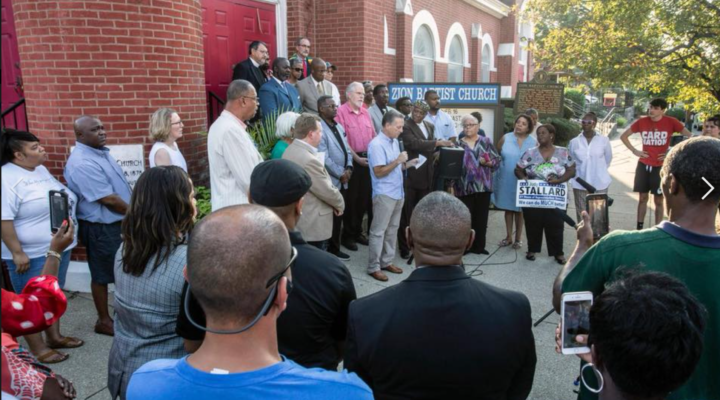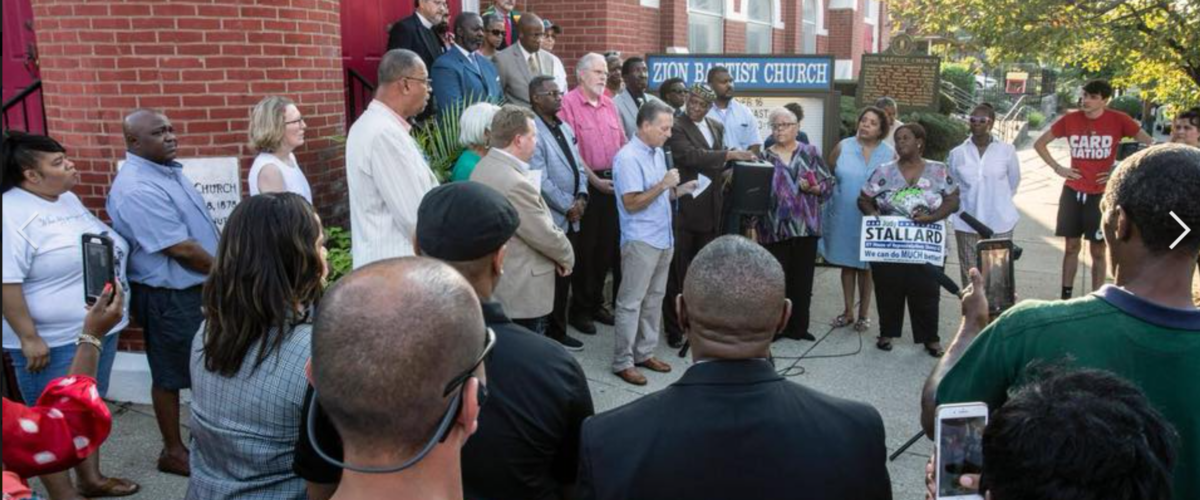Black and white clergy in Louisville, Kentucky, called for a formal review of police policies after a respected ministry colleague was pulled over Saturday night for what some view as the American slang term for racial profiling “driving while black.”
Kevin Cosby, president of historically black Simmons College of Kentucky, was driving home from the church where he is pastor, St. Stephen Church, after hosting the 2018 Angela Project Conference, a two-day confab sponsored by groups including the Cooperative Baptist Fellowship.
After a white officer reportedly asked both Cosby and his wife, a front seat passenger, for identification, the pastor began recording the interaction on his mobile phone. Their daughter later posted the video on Facebook, with the comment that she believes her parents were targeted because they were black and driving an Audi.
On Tuesday groups including Empower West Louisville, a three-year-old ecumenical partnership between black and white churches across the city to address racial and economic inequality, convened a press conference at the intersection where the traffic stop occurred.
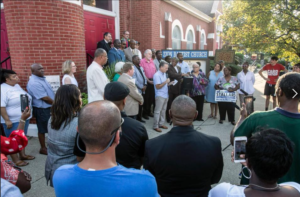
Minister-at-large Joe Phelps reads from notes during Tuesday’s press conference at the corner of 22nd and Muhammad Ali Boulevard in downtown Louisville. (Photos posted on Facebook by Simmons College executive vice president Frank Smith Jr.)
Cosby’s daughter, Christine Cosby-Gaither, said people may disagree about whether the stopping of her parents constitutes racial profiling, but there are two lessons on which “all reasonable people” can agree.
“Number one, no person should be stopped by the police and addressed in a flippant and accusatory way as was the case with my parents,” she said. “Because of the present climate, the highest degree of courtesy and professionalism should always take place when engaging residents in the black community.”
The Facebook video begins with Cosby “wondering why I am being stopped.”
“I’m being stopped by a police officer for no reason at all,” the pastor says. “He just asked for my ID.”
“He asked us what we were up to,” Cosby’s wife interjects.
Minutes later a white police officer steps to the car window and says, “Sir and Ma’am, thank you all for you all’s cooperation.”
“Why were we stopped?” Cosby asks.
The officer replies that Cosby had blocks earlier made an illegal turn and there was problem with plastic frame surrounding his license plate.
“That’s the reason for the traffic stop, sir,” the officer says. “I came up to get your driver’s license and make sure everything checks out. It’s valid and shows you have insurance on the car, so I’ll let you off with a warning.”
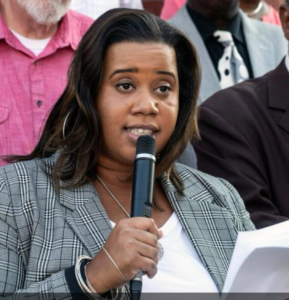
Christine Cosby-Gaither
Cosby’s daughter said secondly that the encounter speaks “to a larger issue of strained police and black community relations.”
“By no means are we judging the intent or the heart of the police officer, nor are we calling for his termination,” she said. “However, we feel that his actions were inappropriate and reflect the frustration of many black citizens that they are poorly treated by the police and the judicial system.”
Joe Phelps, retired pastor of Highland Baptist Church in Louisville, said in 47 years of driving “I have never once been stopped by a police officer for an illegal turn or a dealer-installed license frame.”
As a “lead-footed younger adult, “ Phelps admitted that he was “stopped many times,” but “never once was my passenger asked to present identification.”
Phelps, who is white, said Cosby does not want the incident to focus on him because of his status in the community but is rather “about all of the people of West Louisville.”
“Policing that feels to black Louisvillians like harassment must stop,” Phelps said. “Dr. and Mrs. Cosby have specifically requested that the officers involved not be fired. They made a mistake. Dr. Cosby’s desire is to redeem the situation by exposing the police officers’ need for training.”
Phelps, long involved in efforts to reduce Louisville’s epidemic of gun violence, said policies and procedures must change
“There are some in West Louisville who frankly see Saturday night’s police stop of Dr. Cosby as a not-so-subtle message saying we are watching you,” Phelps said. “If that is the case, and I don’t know if it is, but if it is, I say on behalf of awakening white Americans, we are watching you.”
“We are watching to see if our police and political leaders work to improve or work to divert attention,” Phelps warned. “We’re also watching if the police force and the FOP help any efforts to rid our police department of officers who are affected by their prejudice.”
Jason Crosby, pastor of Crescent Hill Baptist Church, said he regrets the couple had to endure the experience but is “thankful that they arrived home safely.”
“Given a different set of dynamics that could have unfolded in that interaction, the situation could have ended much more tragically,” Crosby said.
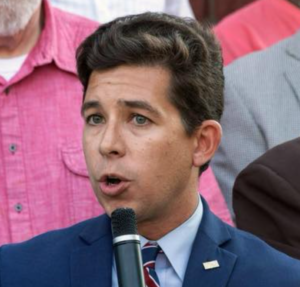
Jason Crosby
Crosby said dialogue about community policing needs to take place not only in West Louisville but that “white people who are residents of our community all across this community need to use this as an opportunity to rethink their understanding of race relations in our city.”
Crosby said he doesn’t know what the officers who stopped Cosby were thinking at the time, but he speculated “that they are probably like most white people.”
“Most white people don’t think they are racist,” Crosby said. “Most white people have black friends. Most white people cheer for basketball players down at the YUM! Center who are black. And then they tell themselves that ‘I like black people. I have friends who are black people. I work with black people.’ But the reality is that racism in the United States these days is less about personal animus directed toward another person. Racism takes place in systemic and structural ways.”
David Snardon, pastor of Joshua Tabernacle Baptist Church and a lifelong West Louisville resident, described the community as “overpoliced,” “disinvested in” and a place “where you have pockets of poverty that produce crime because of the environment.”
“Being in that kind of community, let me first say I’ve got to live here,” said Snardon, president of the Interdenominational Ministerial Coalition. “So let me start by saying this: We support the police. We support good police. I’ve got to live here, so I’m not trying to start a war with police. This is not a police issue. It is a policy issue.”
Prior to the press conference, the Louisville Metro Police Department announced the stop will be investigated by the department’s Professional Standards Unit.
“Accusations of racial profiling by any member of our community have been and continue to be taken very seriously,” Police Chief Steve Conrad said in a statement. “We will review this incident to determine if officers acted according to our policies. Additionally, we will use this as an opportunity to review how officers are trained in handling traffic stops.”
Mayor Greg Fischer said he has spoken with both the police chief and Cosby and is glad the LMPD is planning a review.
“As mayor, I will continue to direct all Metro agencies, including LMPD, to look for ways to improve their operations and community relationships,” said Fischer, a Democrat elected in 2010.
Cosby has not commented publicly about the incident. Chris Sanders, a Louisville attorney and coordinator for Empower West Louisville, said the college president and first lady “were personally insulted and humiliated” by their treatment.
“They insist that this issue is not about them, but about the many, many people who get treated the same way, over and over,” Sanders said. “So community pastors, white and black, are speaking to express their outrage for the many.”
Phelps said people in West Louisville want “substantive and measurable changes to policies which currently allow ill-prepared officers on the streets.”
Phelps said many residents of the community that he talks to “see the police not as their friends and defenders but rather as their harassers, their overlords — the neighborhood bullies.”
Previous stories:
KBF, historically black college, join forces to fight poverty
Pastors seeking to empower West Louisville unimpressed by governor’s prayer-walk solution

